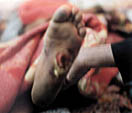
Breaking the Impunity of Security Officers Who Violate the Law STANDING UP TO TORTURE [Archives:1998/47/Front Page]
November 23 1998
A ‘thank-you’ note to Dr. Abdul-Karim Al-Iryan’s government is in order. It has seen light in what has been a long and hard fight. The showdown had gone on for 4 days, as the attorney-general and the human rights committees in Parliament and the Consultative Council were fighting to up-hold the law.
Then it happened.
Three officers accused of torture were brought in under guard to the office of Sanaa City’s Head Attorney for interrogation.

Suddenly, two of the officers changed the subject. “Where are the sex video tapes?” they asked.
He was surprised – of the change of subject and the tone. Apparently, one of the people in the dispute was not happy with Khaled’s testimony. He had whispered into the ears of the officers that the witness had sex video tapes at home.
That proved to be a long night for Khaled. The two security officers – Hisham Al-Ghazali and Hameed Omar – worked on him for several hours. A third assistant was on stand-by.
They clobbered him savagely, until there were wounds seven centimeters wide and two centimeters deep on his feet. They clubbed his head and face. They applied electric shocks to the nerves of his finger knuckles leaving painful wounds. They hanged him upside down from the ceiling for a long time. The next day, more torture was applied.
It was not until the 14th that Deputy Attorney Mansoor Al-Hashedi forced his release.
Al-Qadhi, from a tribal grouping in Al-Haima, contacted his tribesmen who flocked in for his rescue. He himself works for the Military Maintenance of the armed forces. He also has relatives in the Sanaa attorney office and in the justice system.

Members of the human rights and defence/security committees in parliament, acting on an order from Speaker Sheikh Abdullah Bin Hussain Al-Ahmar visited the investigations bureau to collect information on the case. Dr. Abdulaziz Al-Saqqaf and Dr. Abubakar Al-Qirby of the Human Rights Committee of the Consultative Council also paid a visit to get first-hand information on the case.
For three days, the official request of Tareq Al-Aghbari, Head of the Sanaa City Attorney Office, to interrogate the 3 security officers implicated in the torture – Hisham Al-Ghazali, Hameed Omar and Mujahid Al-Quhali – went unheeded. The Minister of Interior insisted that he will not give his men to ‘civilians’ to be penalized. He, in fact, kept the men in the compound of ‘his’ ministry.
Dr. Abdullah Al-Olofy, Attorney-General, and a man who has given to the law new meaning by trying to fully up-hold it, called the Prime Minister, Dr. Abdul-Karim Al-Iryani. He did not get a satisfactory answer. He was told he could send his interrogators to the Ministry of Interior to do the questioning over there.
It was at this stage – on November 16th – that the Human Rights, Liberties and NGOs Committee at the Consultative Council intervened. It sent a correct, yet strongly worded letter to the prime minister, asking him to instruct his minister to lift his hand off the case. The security officers, and everybody else, must bow to the law.
After 24 hours, when there was no answer, the Human Rights, Liberties and NGOs Committee dispatched its first “Torture Alert”. The circular went to 80 organizations and diplomatic circles inside and outside the country. Thus, hell broke loose.
As the situation began to get complicated, the Minister of Interior bowed. Before high noon on the 18th, the three officers were brought to the head of the Sanaa City Prosecution Office. Mr. Tareq Al-Aghbari called Dr. Al-Saqqaf with the good news – IT HAS HAPPENED! “We have broken the impunity of security officers who break the law.”
It was a moment to rejoice. It comes only three days after another fight was successfully completed. Dr. Al-Murtadha Al-Muhatwari, who had been imprisoned illegally was released on 16th November. There too, the partnership between the office of the Attorney-General and the Human Rights Committee at the Consultative Council brought fruit to bear in upholding the law.
Now, the two partners are working to resolve an earlier problem – the death of Wadee’ Al-Shaibani while under interrogation in Aden. The first step in this direction is to allow an impartial autopsy to be conducted on the body, which still languishes in the freezer of Aden Hospital. The new autopsy will be carried out with the full involvement of the family of the deceased Wadee.
——
[archive-e:47-v:1998-y:1998-d:1998-11-23-p:./1998/iss47/front.htm]


